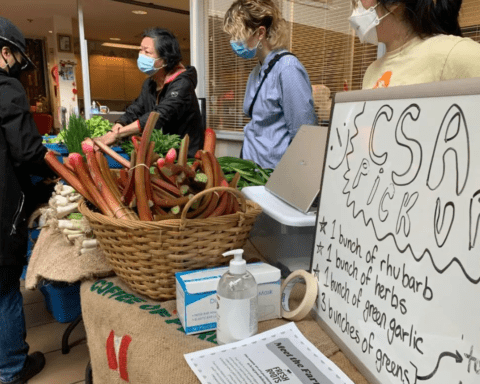British Columbia sits on a precipice and will either fall into a minority Liberal government, an NDP minority government or a possible Liberal majority, depending on the results of the absentee votes and any recounts. This is one election where one vote could turn out to make the real difference.
Christy Clark is, of course, trumpeting the line that the BC Liberals will continue to govern and not wearing the fact that people wanted a change and her popularity has wilted drastically. If Clark retains power, I would predict she doesn’t make any change in the way she governs and that this election will not be a wake-up call to the Liberal party.
If there is a minority government, which many predict, it will definitely be a new world for B.C.
Will the government be able to build a better future for those of us who make B.C. our home? I sure hope so.
Whether many of the needed changes are made will be in the hands of the BC Greens, who hold the balance of power. The NDP and Liberals will have to work with the Greens to make decisions. The key to success of any initiatives will be finding agreement with the Green Party.
It is going to be a very interesting four years. Reversal of decisions on major projects like Site C and Kinder Morgan is a real possibility. Achieving electoral reforms, including an end to unlimited political donations, is now closer. If we thought the B.C. legislature was a battleground before this, it is nothing compared to what we will witness ahead.
As a First Nations person I am disappointed that more people didn’t vote to make the difference we needed. We are at a critical state in this province and only 57 per cent of voters went to the polls.
Uncertainty will be something we will live with until we get final results. If there is a minority government, that uncertainty will continue while parties wheel and deal on their priorities. This is a time when people will really learn about the values of the Green party as they will play a major role with a minority agreement.
Clark’s survival shows our system is broken
By Andrew Nikiforuk
It is outrageous that a government so Trumpish in character, so wedded to alternative facts and so visibly supportive of growing economic inequality still won a minority government. It proves that Canadians have as many political problems as the Americans and that a diminished press allows those with the most money to engineer political control.
Expect more volatility. And another election soon.
A Schrödinger election?
By Crawford Kilian
Erwin Schrödinger’s famous thought experiment seems very applicable to B.C. politics after yesterday’s election. Imagine, he suggested, a cat put in a sealed box. A source of radiation may fire a random particle into a Geiger counter, causing a hammer to smash a vial of cyanide and kill the cat. Or it may not.
Schrödinger argued while the box is closed, the cat is simultaneously alive and dead, in a state of “quantum superposition.” When we open the box, reality “collapses” in a single cat, alive or dead.
The B.C. 2017 election box won’t be opened until May 24 and the official vote count. Given the outcome of the vote, all three parties are in a similar state of superposition, simultaneously alive and dead. Recounts and the absentee vote may cause reality to collapse into a majority Liberal government; or a majority NDP government; or a Liberal-Green coalition; or an NDP-Green coalition. (A Liberal-NDP coalition, with the Greens as the opposition, seems too weird even for B.C.)
Even then, a coalition would be another kind of superposition. If Andrew Weaver makes a deal with Christy Clark and becomes a cabinet minister in a Liberal government, he’ll have to extort an end to Site C and the Kinder Morgan pipeline — or go the way of David Emerson, who defected to the Harper Conservatives within days of being elected as a Liberal MP. His whole party would lose credibility.
Both Weaver and his party seem likelier to survive a deal with the New Democrats, who are largely on the same wavelength. But they would have to get past some hard feelings about vote splitting and Weaver’s late-campaign blowing of kisses toward the Liberals.
Whatever the coalition, its members should bear in mind that its half-life will be short. The larger party will ditch its Green allies the moment it seems opportune to do so, and we’ll all be back in Schrödinger’s box again, awaiting yet another political reality.
Green voters helped Liberals stay in power
By Paul Willcocks
You don’t have to support strategic voting to recognize it could change the outcome of elections.
On Tuesday, Green voters who ignored the idea of strategic voting handed three seats to the BC Liberals, turning a potential NDP majority into a Christy Clark minority government.
It’s not reasonable to assume all Green supporters would consider voting strategically. And in three ridings, the party had a realistic chance of winning.
But assume half the party’s voters in other ridings decided to cast a vote to ensure the party they preferred — Liberal or NDP — formed government. That means 74 per cent go NDP, 26 per cent go Liberal, according to a Mainstreet poll on voters’ second choices.
Run the calculations on all 87 ridings, and you’ll find the NDP would have taken Coquitlam-Burke Mountain, Richmond-Queensborough and Vancouver-False Creek, all seats that went to the Liberals. Two NDP seats at risk of being lost to recounts — Courtenay-Comox and Maple Ridge-Pitt Meadows — would be secure.
And the New Democrats would have the slimmest of majorities, with 44 seats to the Liberals 40 and Greens three.
Republished with permission from The Tyee.




